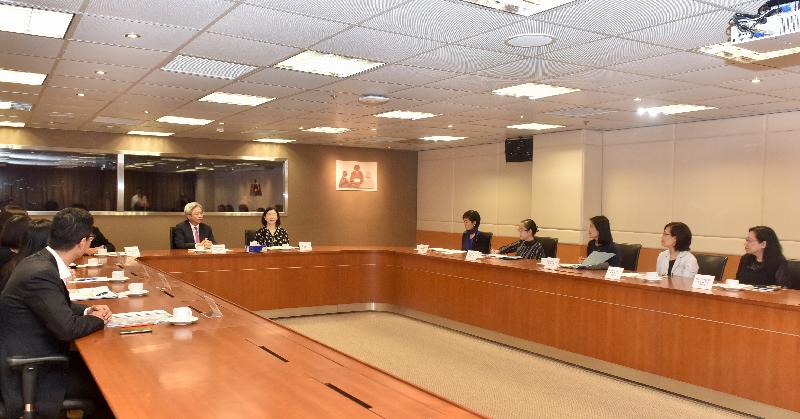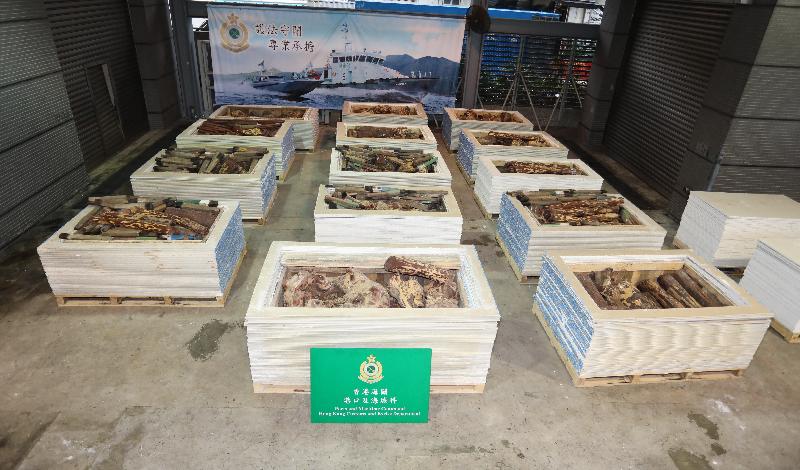LCQ13: Reducing the use of plastic bottles and raising their recycling rate
Following is a question by the Hon Kenneth Leung and a written reply by the Secretary for the Environment, Mr Wong Kam-sing, in the Legislative Council today (June 6):
Question:
On reducing the use of plastic bottles and raising their recycling rate, will the Government inform this Council:
(1) given that the Government has stipulated a ban on the sale of plastic bottled water measuring one litre or less in the tender exercises, conducted on or after February 20 this year, for the provision of automatic vending machines at government venues, of the current number of automatic vending machines at the various government venues that do not sell plastic bottled water; whether it has assessed the impact brought about by such a measure on the disposal quantity and recycling rate of plastic bottles; if so, of the outcome; if not, the reasons for that;
(2) of the current number of water dispensers at the various government venues; the number of water dispensers to be added to the various government venues in the coming three years and the relevant details;
(3) of the respective quantities of waste plastic bottles that were (i) exported, with a breakdown by export destination, and (ii) recovered and recycled locally, in each of the past five years; the processing procedures as well as end-uses of waste plastic bottles that are recycled locally;
(4) whether it has set targets on the disposal quantity and recycling rate of waste plastic bottles; whether it will enact legislation to impose a total ban on the sale of the various kinds of drinks in plastic bottles; if so, of the details and timetable; if not, the reasons for that; and
(5) of the latest progress and outcome of the feasibility study on the producer responsibility scheme on plastic product containers; the details of the next step of work and timetable?
Reply:
President,
The Government strives to encourage all sectors of our community to rise up to the challenge of waste management. Efforts are focused on minimising the generation and use of one-off disposable plastics while promoting clean recycling, thereby reducing the overall disposal of waste plastics. To this end, we have adopted a multi-pronged approach by taking forward initiatives on various fronts. They include introducing legislation and policies, strengthening education on and support to community recycling, and upgrading the operational standards and efficiency of the recycling industry, etc. These initiatives also help the sector address challenges brought about by the tightening of Mainland requirements on imports of recyclables, and at the same time embrace new opportunities thus arise. My reply to the question raised by the Hon Kenneth Leung is as follows:
(1) and (4) The measure on ceased sale of plastic bottled water by automatic vending machines (AVMs) at government venues is applicable to plastic bottled water measuring one litre or less. Currently, there are some 1 600 AVMs at government venues. Over 40 per cent of these AVMs implemented the arrangement of ceased sale on February 20, 2018, and by mid-2019 the arrangement will be implemented by over 80 per cent of these AVMs. We have already issued internal guidelines to encourage government bureaux/departments (B/Ds) to persuade their AVM suppliers/operators to voluntarily implement the arrangement under their existing contracts as early as possible. By launching the measure on ceased sale, the Government hopes to further create a social environment where the public is encouraged to cultivate the habit of bringing their own water bottles, and to enhance collaboration in waste reduction at source among various quarters and enterprises of the community. Such measures will help promote the practice of "Use Less, Waste Less" and have positive impacts on reducing the disposal of waste plastic bottles. However, the actual impacts of these measures might not be reflected directly in the relevant waste statistics within a short period of time. The Government will continue to step up promotion of reducing the use of plastic bottles as well as support the relevant recycling efforts on various fronts. Nonetheless, as formulation of many initiatives is underway, we are unable to set targets for the disposal quantity and recovery rate of waste plastic bottles.
As to the proposal on totally banning the sale of plastic bottled beverages through legislation, we understand that most countries worldwide enhance the recycling rate of waste plastic bottles and alleviate the burden to the environment posed by disposed waste plastic bottles mainly through multiple measures, and do not head towards the direction of totally banning the sale of plastic bottled beverages through legislation. When the relevant proposal is considered, a prudent balance has to be struck among the various considerations, and a consensus at community level must be reached. At this stage, the Government has no plan in this respect. Meanwhile, the Government will continue to implement a series of measures to enhance reduction of plastics at source with strengthened recycling support. The specific measures are detailed in parts (2) and (5) of the reply below.
(2) Currently, there are a total of over 10 000 water dispensers at government venues, with about 2 700 mainly serving the public. These water dispensers are mostly installed at the active leisure facilities managed by the Leisure and Cultural Services Department, such as sport centres, sport grounds and swimming pools, to provide drinking water for the public. To further promote waste reduction at source, the Environmental Protection Department (EPD) is co-ordinating with various government B/Ds to install additional water dispensers as necessary at new government venues and suitable existing government venues when conducting renovation works, subject to actual circumstances and technical feasibility.
In addition, we also launched a Waste Reduction Guidebook for Large Scale Event Organisers (Guidebook) at the end of last year, which provides clear information and practical examples to encourage and assist event organisers and participants in achieving waste reduction at source. The Guidebook recommends, among other things, that organisers set up on-site water refilling stations at the event venues and encourage participants to bring their own reusable bottles.
(3) The volumes of domestic exports and re-exports for waste polyethylene terephthalate (PET) bottles in 2017, broken down by destination, are set out at the Annex. We have not compiled any trade statistics on waste PET bottles for 2016 or before. Besides, as no particular code number is assigned to waste plastic bottles other than those made of PET under the Hong Kong Harmonized Commodity Description and Coding System, trade figures on such bottles are unavailable.
Locally recycled products only refer to plastic or mixed-material products that are made of recovered plastic materials through deep processing (involving procedures such as melting and pelletising). Currently, the EPD does not compile a breakdown of the waste plastic bottles that are recycled locally, nor breakdowns by their local processing procedure as well as end-use.
To assist the recycling sector to address the progressive tightening of Mainland requirements for import recyclables, the Recycling Fund announced in September 2017 that $20 million had been earmarked to expand the list of fundable items under "Standard Projects" to help upgrade recyclers' ability in turning waste plastics into plastic products or raw materials as well as processing waste paper. The Recycling Fund has also earmarked $50 million for encouraging recyclers to use compactor trucks for more effective and efficient transportation of waste plastics and waste paper, thereby reducing the collection and transportation costs incurred. We will also continue to support development of the recycling sector (including the plastics recycling trade) through the provision of sites under short term tenancy or long term lease (such as the EcoPark).
(5) The EPD appointed a consultant through open tender in October 2017 to conduct a feasibility study on how to implement a producer responsibility scheme (PRS) targeting suitable plastic product containers, mainly those carrying beverages or personal care products. The consultant will review and analyse the practices in other jurisdictions and the actual situation in Hong Kong, as well as the implications of introducing the PRS on different stakeholders. In the process, the consultant will engage with relevant trade associations and seek their views before submitting a proposal to the EPD. The consultant is collating relevant information so as to draw up an operational framework for the PRS on plastic product containers. The whole study is expected to be completed in the first half of 2019. We plan to publicise the preliminary proposal of the consultant in due course.
In view of the low economic value of waste plastics, the EPD and the Environmental Campaign Committee are stepping up their current efforts in publicity and public education on clean recycling. The key areas include encouraging citizens to recycle waste plastic bottles first, in particular those of beverages or personal care products, and practise clean separation and recycling to facilitate subsequent recycling processes and seeking of further outlets. To encourage members of the public to proactively practise source separation and clean recycling, we have launched the Community Participation Programme in Environmental Protection in collaboration with the 18 District Councils, introduced the Source Separation of Waste Programme at community level, established the Community Recycling Network and Community Green Stations (CGSs) across the territory, and supported non-profit-making organisations in such areas as conducting educational activities and promoting community recycling through the Environment and Conservation Fund, etc. Besides, the EPD is preparing for the implementation of a pilot scheme on district central collection of waste plastic bottles to collect those received by the CGSs and Community Recycling Centres and, where necessary, those from public and private housing estates as well as public bodies, such as schools, in a direct manner. These waste plastic bottles will then be delivered to competent recyclers for onward processing. Moreover, we are pressing ahead with the preparations for municipal solid waste charging to provide financial incentives for our citizens to reduce their overall waste disposal and actively participate in source separation and recycling of waste materials including plastics, with a view to fostering a circular economy.

